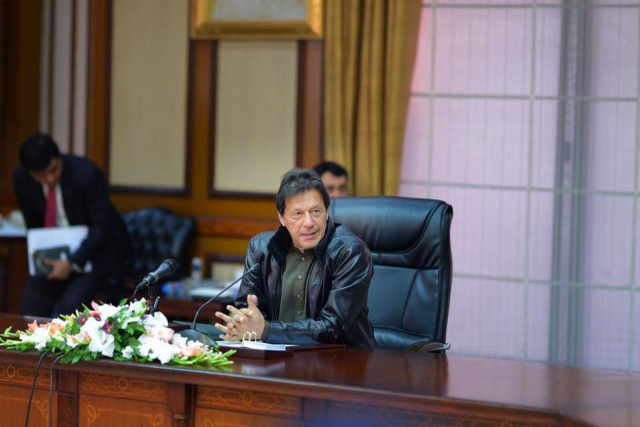Pakistan's federal govt asks provinces to share cost of subsidies
Also proposes the setting up of fund for security-related expenses

PM Imran Khan. PHOTO: PTI
The finance ministry formally gave four proposals in a meeting of a sub-group of the National Finance Commission (NFC), which was held on Tuesday.
It also proposed that the size of federal divisible pool should be redefined and a percentage of undivided divisible pool should be set aside for meeting expenses of Azad Jammu and Kashmir (AJK) and Gilgit-Baltistan (G-B).
However, the proposal of changing the composition of the divisible pool of taxes was not discussed in the meeting.
There was no consensus on all of these proposals as the provinces took the position that the Centre’s fiscal woes was because of the failure of the Federal Board of Revenue (FBR) and they could not be punished for the FBR’s sins, sources told The Express Tribune.
Provincial representatives opposed the recommendations of the finance ministry and sought plausible justifications for slashing the share of provinces, they added. NFC members of the provincial governments were of the view that the federal government did not provide evidence to substantiate its claims.
The outcome of the sub-group meeting suggests that there may not be an early agreement on the vertical distribution of resources, which could further delay finalisation of the 8th NFC Award.
The meeting of the NFC sub-group was held 10 days before the NFC meeting that may take place on March 29 in Lahore. The sub-group is led by the federal government that will make recommendations on vertical distribution of the divisible pool between the Centre and federating units.
At present, the Centre gets 42.5% from the divisible pool and the rest is distributed among provinces on the basis of multiple criteria including population size, revenue generation, inverse population density and poverty. Under the constitution, the provincial share cannot be lowered from the current level of 57.5%.
The finance ministry took the stance that of the total receipts, the Centre got only 46% of the resources, but 60% of the total expenditures were borne by it, which had made the federal government fiscally unviable.
World Bank sees Pakistan's potential to be a $2 trillion economy
The ministry argued that net receipts of the federal government were insufficient to meet expenditures of defence and debt servicing cost.
All expenditures on running the civil government, paying pensions and part of defence expenditures are being met by borrowing from domestic and foreign creditors, according to the finance ministry officials.
In order to overcome these challenges, the ministry proposed to revisit the composition of the divisible pool, sharing obligatory expenditures related to security and special areas and sharing the cost of subsidies on energy, Benazir Income Support Programme and Higher Education Commission, according to an official of a provincial government.
The finance ministry proposed that provincial governments should pick the cost of subsidies and the Centre should have the right to deduct upfront that cost from the share of respective provinces.
It also proposed that provincial governments should allocate a share from the undivided divisible pool to meet expenses of AJK and G-B. It argued that these two special regions were demanding their share in the NFC.
“The provinces cannot agree on setting aside a share of resources to meet expenses of AJK and G-B until these regions are declared provinces under the constitution,” a member of the NFC told The Express Tribune.
He said the provincial representatives asked the federal government to amend the constitution before seeking the share in resources from the provinces.
The finance ministry also proposed the establishment of a fund for security-related and disaster management expenditures, arguing that only additional expenses on security was over Rs500 billion. The ministry stated that the federal government raised around 100 new battalions of paramilitary forces to provide security for China-Pakistan Economic Corridor (CPEC) projects.
The provincial representatives were of the view that the federal government was charging up to 2% of the total cost of CPEC projects and it should not demand any more funds for the purpose from the provinces, according to the meeting participants.
However, the NFC members of the provinces were of the view that the 7th NFC had been signed on the assumption that the FBR’s tax-to-GDP ratio would increase to 14% by 2016. But actually, the ratio stood at only 11% by the end of last fiscal year and it may slip below that level.
They said taxation was a federal subject and the finance ministry should try to improve its performance instead of shifting responsibility on to the provinces. The provincial representatives also asked the federal government to rationalise the Public Sector Development Programme (PSDP) and also refrain from making a major increase in pensions that also put extra burden on them.
The finance ministry also made a proposal for changing the composition of the federal taxes. But the proposal was not discussed. According to the proposal, there is no embargo on changing the composition of the divisible pool of taxes. Under Article 160 (6), the president can omit any tax from the pool.
At present, eight types of taxes constitute the divisible pool. These are income tax, wealth tax, capital value tax, taxes on sales and purchases of goods imported and exported, produced, manufactured or consumed, export duties on cotton, customs duties, federal excise duties and any other duty levied by the federal government.
It sought exclusion of certain taxes from the divisible pool to correct the structural imbalance. But Sindh is demanding the inclusion of petroleum levy in the divisible pool, which is treated as non-tax revenue by the federal government.
Published in The Express Tribune, March 20th, 2019.
Like Business on Facebook, follow @TribuneBiz on Twitter to stay informed and join in the conversation.



















COMMENTS
Comments are moderated and generally will be posted if they are on-topic and not abusive.
For more information, please see our Comments FAQ